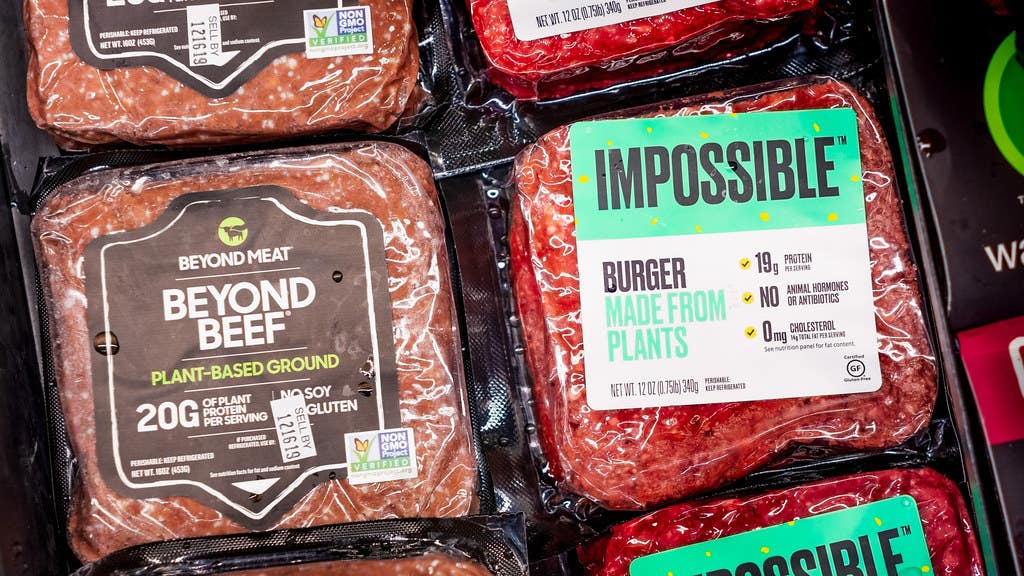Plant-based meat ‘healthier and more sustainable than animal products’, study finds
Study concludes that plant-based meat and dairy alternatives ‘offer a healthier and more environmentally sustainable solution.

[August 13, 2022: Chris Melvin, University of Bath]
The review from Chris Bryant considered environmental and health factors associated with plant-based meat products. (CREDIT: AdobeStock)
A new paper published in Future Foods argues that because these foods are ‘specifically formulated to replicate the taste, texture, and overall eating experience of animal products’, they are a much more effective way of reducing demand for meat and dairy than simply encouraging people to cook vegetarian whole foods.
The study, conducted by psychologists at the University of Bath, concludes that plant-based meat and dairy alternatives ‘offer a healthier and more environmentally sustainable solution which takes into account consumer preferences and behaviour.’
The review examined 43 studies into the health and environmental impacts of plant-based foods, as well as consumer attitudes. One study found that almost 90% of consumers who ate plant-based meat and dairy were in fact meat-eaters or flexitarians; another found that plant-based products with a similar taste, texture, and price to processed meat had the best chance of replacing meat.
The paper also found that these plant-based products caused lower levels of greenhouse gas emissions than the animal products they were replacing. One paper found replacing 5% of German beef consumption with pea protein could reduce CO2 emissions by up to eight million tonnes a year. Another found that compared to beef burgers, plant-based burgers were associated with up to 98% less greenhouse gas emissions.
Related Stories
The report authors suggest that plant-based products generally require much less agricultural land, need less water and cause less pollution than animal products.
Studies focusing on the healthiness of plant-based products also found they tend to have better nutritional profiles compared to animal products, with one paper finding that 40% of conventional meat products were classified as ‘less healthy’ compared to just 14% of plant-based alternatives based on the UK’s Nutrient Profiling Model.
Others found plant-based meat and dairy were good for weight loss and building muscle mass, and could be used to help people with specific health conditions. Food producers may be able to add ingredients such as edible fungi, microalgae or spirulina to plant-based foods, boosting properties such as amino acids, vitamins B and E and antioxidants. Future innovations in processing and ingredients are likely to lead to further nutritional improvements.
Relative environmental impact of Beyond burgers compared to beef burgers
Report author, Dr Chris Bryant from the University of Bath, said: “Increasingly we’re seeing how plant-based products are able to shift demand away from animal products by appealing to three essential elements consumers want: taste, price and convenience.
“This review demonstrates overwhelming evidence that, as well as being far more sustainable compared to animal products in terms of greenhouse gas emissions, water use and land use, plant-based animal product alternatives also have a wide range of health benefits.
Consumer perceptions of PB-APA vs. beef healthiness when seeing the nutrition label only vs. nutrition label + ingredients label.
“Despite the incredible advances that plant-based producers have made over recent years, there is still huge potential to improve their taste, texture and how they cook. There’s also enormous potential to innovate with ingredients and processes to improve their nutritional properties – for example by boosting vitamin content.”
The authors stress that, whilst there are health benefits of these products compared to meat, multiple personal factors will impact on health including overall calorie consumption and exercise/activity levels. People wishing to transition towards more plant-based products and vegetarian / vegan diets can find more information via the NHS: The vegetarian diet - NHS (www.nhs.uk) + The vegan diet - NHS (www.nhs.uk)
Dr Bryant suggests that more research will now be needed to make these improvements a reality, ensuring manufacturers can make products that taste better, are healthier and provide consumers with sustainable options that are more likely to reduce demand for meat.
Note: Materials provided above by University of Bath. Content may be edited for style and length.
Like these kind of feel good stories? Get the Brighter Side of News' newsletter.
Joshua Shavit
Science & Technology Writer | AI and Robotics Reporter
Joshua Shavit is a Los Angeles-based science and technology writer with a passion for exploring the breakthroughs shaping the future. As a contributor to The Brighter Side of News, he focuses on positive and transformative advancements in AI, technology, physics, engineering, robotics and space science. Joshua is currently working towards a Bachelor of Science in Business Administration at the University of California, Berkeley. He combines his academic background with a talent for storytelling, making complex scientific discoveries engaging and accessible. His work highlights the innovators behind the ideas, bringing readers closer to the people driving progress.



